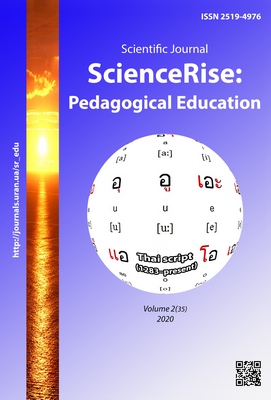Anomalies of schoolchildren’s educational activities and ways of their surmounting
DOI:
https://doi.org/10.15587/2519-4984.2020.199393Keywords:
consequences of abnormal educational overload in schoolchildren, morbidity, academic failure, delinquency, standardizing of educational processAbstract
The deep historical roots of the problems in schoolchildren’s educational activity normalizing and educational overloads elimination, as well as standpoints of outstanding teachers of the past in these problems are revealed. On the basis of the modern pedagogical, medical-hygienic and criminological studies analysis, the long chain of dangerous consequences of the abnormal educational overload in schoolchildren is determined. The consequences of anomalies include: the loss of teachers' ability to implement the principle of training accessibility and other didactic principles; loss of students' desire to learn; mechanical learning of an educational material, which can even lead to torpidity; compulsory nature of pupils' learning activity and the authoritarianism of teachers, caused by it; zero (failure) level of mastering mathematics, physics, chemistry and other subjects; dramatically high morbidity of schoolchildren; lack of discipline, pedagogically neglected children, which in turn becomes the cause of juvenile delinquency and so on. The necessity and possibility of overloads elimination and normalizing the educational activity of schoolchildren at the government level is substantiated. Significant reserves have been considered for a practical solution to these problems, related to the domestic experience of the 1920s in the development of tightly scheduled curricula and manuals for trainees, with the current experience in reforming the content of education in Singapore. In this context, there is also evidence that in Ukraine in the 60-80's of the twentieth century the path to the standardized training implementation was laid by school pedagogical teams, headed by V.O. Sukhomlinsky and G.Ye. Hlushchenko. The article also identifies the priority measures for practical implementation of standardized educational activities of schoolchildrenReferences
- Kvintilian, M. F. (1971). O vospitanii oratora. Khrestomatija po istorii zarubezhnoi pedagogiki. Moscow: Prosveshchenie, 40–46.
- Komenskii, Ia. A.; Piskunov, A. I. (Ed.) (1982). Velikaia didaktika. Izbrannye pedagogicheskie sochineniia. Vol. 1. Moscow: Pedagogika, 242–476.
- Grombakh, S. M. (1988). Rol shkoly v formirovanii psikhicheskogo zdorovia uchashchikhsia. Shkola i psikhicheskoe zdorove uchashchikhsia. Moscow: Meditsina, 9–32.
- Vsesviatskii, B. V. (1996). Problemy didaktiki biologii. Moscow: Prosveshchenie, 240.
- Nauka i uchebnyi predmet (1965). Sovetskaia pedagogika, 7, 3–25.
- Tkhorzhevskyi, D. O. (1999). Derzhavnyi standart zahalnoi serednoi osvity i dyferentsiatsiia zmistu navchannia. Pedahohika i psykholohiia, 4, 47–51.
- Bespalko, V. P. (1988). Teoriia uchebnika: Didakticheskii aspekt. Moscow: Pedagogіka, 160.
- Stepanenko, M., Lutfullin, V. (2018). Normy y anomalii navchalnoi diialnosti shkoliariv. Vytoky pedahohichnoi maisternosti. Zbirnyk naukovykh prats PNPU im V. H. Korolenka. Seriia "Pedahohichni nauky", 21, 5–9.
- Yarmachenko, M. D. (1978). Aktualni pytannia pedahohichnoi nauky. Kyiv: Znannia, 48.
- Lutfullin, V. S. (2011). Teoretyko-metodychni zasady usunennia navchalnykh perevantazhen uchniv. Poltava: Vydavets Shevchenko R. V., 336.
- Lutfullin, V., Inozemtsev, V., Pilipenko, S. (2017). Regulation of training activities as a key of health protection of pupils and students. ScienceRise: Pedagogical Education, 5 (13), 22–27.doi: http://doi.org/10.15587/2519-4984.2017.102784
- Cuthbert, M. (2017). Curriculum overload and its impact on teasher effectiveness in primare schools. European Journal of Education Studies, 3 (3), 155–162. doi: http://doi.org/10.5281/zenodo.290597
- The overcrowded primary curriculum: a way forward 2014. Available at: https://www.appa.asn.au/wp-content/uploads/2015/08/Overcrowded-primary-curriculum.pdf
- Dubovicki, S., Munjiza, E., Peko, A. (2016). Paradox of student (over)load in elementary school. Available at: https://www.researchgate.net/publication/299534217
- Stenger, M. (2018). Don’t Overload Students: Assigning Too Much Work Discourages Learning. Available at: https://www.opencolleges.edu.au/informed/features/dont-overload-students-assigning-too-much-work-discourages-learning/
- Odinaka, I. (2012). How Information Overload is Affecting Our Learning. 2012. Available at: https://www.opencolleges.edu.au/informed/other/how-information-overload-is-affecting-our-learning/
- Ojo, O. J. (2016). Information Anxiety and Information Overload of Undergraduates in Two Universities in South-West Nigeria. Available at: https://digitalcommons.unl.edu/cgi/viewcontent.cgi?article=3760&context=libphilprac
- Kovaleva, H. (2003). Prychyni padenyia mezhdunarodnoho reitynha rossyiskoho obrazovanyia. Daidzhest pedahohichnykh idei i tekhnolohii, 2, 23–25.
- Wilson, R. (2011). Minimizing Academic Overload. Available at: https://www.brightmontacademy.com/blog/minimizing-academic-overload
- Kievskie matematiki-pedagogi (1979). Kyiv: Vishcha shkola, 312.
- Cukhomlynskyi, V. O. (1977). Vybrani tvory. Vol. 4. Kyiv: Rad. shkola, 640.
- Ostroverkhova, N., Vinnik, A. (1982). Kogda pedsovet uchit tvorchestvu. Narodnoe obrazovanie, 4, 73–75.
- Disterveg, A. (1971). Rukovodstvo k obrazovaniiu nemetskikh uchitelei. Khrestomatiia po istorii zarubezhnoi pedagogiki. Moscow: Prosveshchenie, 385–444.
- Orzhekhovska, V. M. (1996). Profilaktyka pravoporushen sered nepovnolitnikh. Kyiv: ViAn, 352.
- Onyshchenko, N. (2002). Kryterii sformovanosti deviantnoi povedinky v molodshykh shkoliariv. Ridna shkola, 7, 26–27.
- Zubkova, V. M.; Grombakh, S. M. (Ed.) (1988). Gigienicheskie kriterii adaptatsii detei k shkole i faktory ee opredeliaiushchie. Shkola i psikhicheskoe zdorove uchashchikhsia. Moscow: Meditsina, 43–53.
- Pantik V. V. Struktura zakhvoriuvanosti studentiv Skhidnoievropeiskoho natsionalnoho universytetu imeni Lesi Ukrainky. Achievement of high school-2016. Vol. 8. Psykholohyia y sotsyolohyia. Fyzycheskata kultura y sporta. Sofyia: «Bial HRAD-BH» OOD – 72, 67–70.
- Achkan, V. (2016). Innovatsii u shkilnii matematychnii osviti v zarubizhnykh krainakh. Matematyka v ridnii shkoli, 6, 39–44.
- Kupisevich, Ch. (1986). Osnovy obshchei didaktiki. Moscow: Vysshaia shkola, 368.
Downloads
Published
How to Cite
Issue
Section
License
Copyright (c) 2020 Valery Lutfullin, Maxim Lutfullin, Sergey Pilipenko, Andrei Khlopov

This work is licensed under a Creative Commons Attribution 4.0 International License.
Our journal abides by the Creative Commons CC BY copyright rights and permissions for open access journals.
Authors, who are published in this journal, agree to the following conditions:
1. The authors reserve the right to authorship of the work and pass the first publication right of this work to the journal under the terms of a Creative Commons CC BY, which allows others to freely distribute the published research with the obligatory reference to the authors of the original work and the first publication of the work in this journal.
2. The authors have the right to conclude separate supplement agreements that relate to non-exclusive work distribution in the form in which it has been published by the journal (for example, to upload the work to the online storage of the journal or publish it as part of a monograph), provided that the reference to the first publication of the work in this journal is included.







